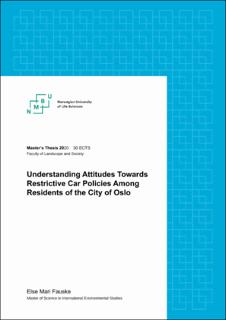Understanding attitudes towards restrictive car policies among residents of the city of Oslo
Abstract
As a means to e.g. reduce GHG emissions, air pollution, and noise, The City Council of Oslo, in line with national-level climate goals, has introduced restrictive car policies through their Climate and Energy Strategy. Those reviewed here are the car-free city center and environmentally- and time differentiated tolls. The aim is to understand attitudes towards these restrictive policies (with an emphasis on tolls); more specifically to explore factors considered to influence attitudes. Tolls have received much attention in the national media, with a particular focus on families with children as being those who would suffer greatly. Given this, the paper is foremost aimed at understanding attitudes amongst residents of Oslo who have (young) children. Secondly, considering the climate and environmental rationales behind the policies, there is a focus on related institutions (conventions and norms). Being a part of the research project ACT at CICERO Center for International Climate Research, an adapted theoretical framework from this project is employed. This framework is built mainly on theories from social psychology and institutional theory. Through 24 semi-structured interviews, this framework is used to identify themes of analysis, while seeking to maintain openness to interviewees’ perspectives.
Findings suggest that several factors may have an influence on attitudes and that the picture is complex. However, some key areas arose: the place of residence, commuting behavior and affectedness of tolls, concern about outcome equity and climate change, environmental norms (or lack thereof), and attitudes in social circle regarding tolls and climate change. Further, those who are positive have younger and more children than do those negative and do not recognize themselves as victims, unlike what one would expect from media coverage on the topic. Overall, the field of action embedding everyday travel behavior does not appear to be institutionalized regarding its environmental impact. This suggests that clear communication concerning the environmental implications of fossil-fueled vehicles is necessary and that norms involving this type of behavior must be further developed in order to achieve emission reduction goals. The influence of lifestyles and cultures revolving these, and the distributional effects of the policies are recognized as important areas of further research and dissemination.

